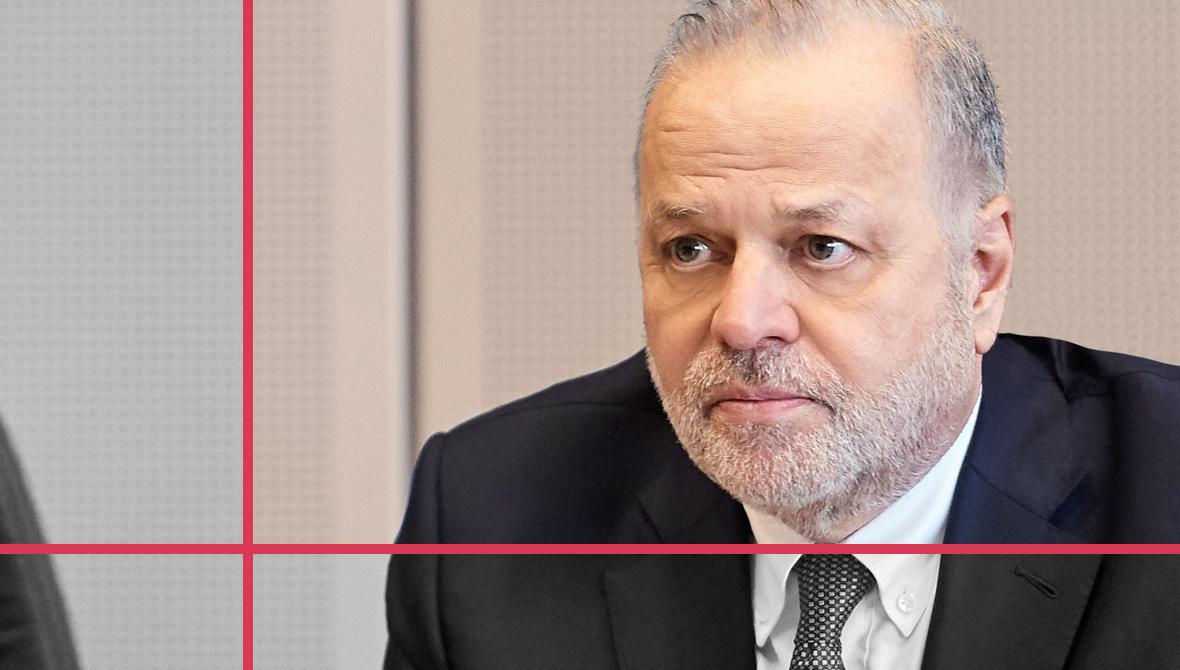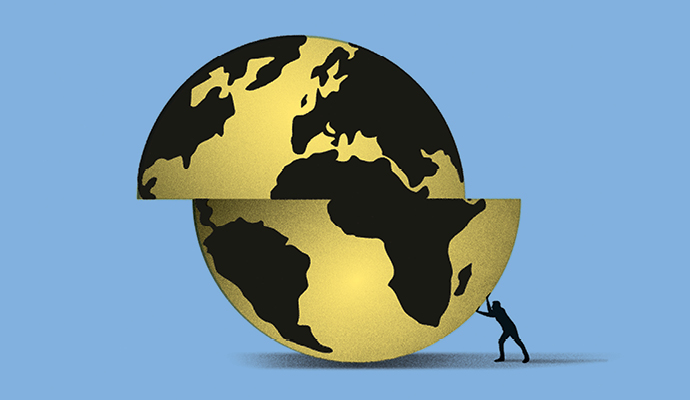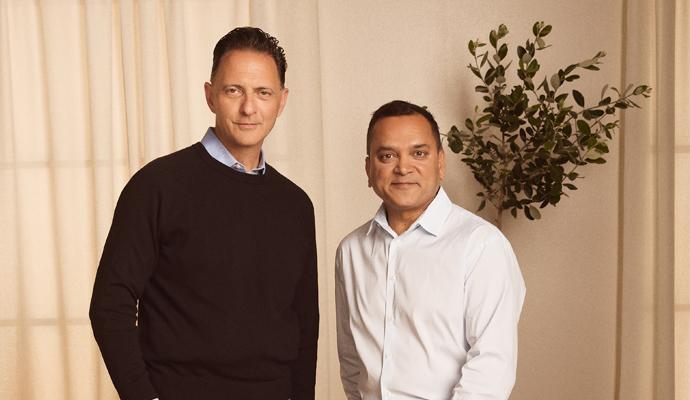Powering the net-zero transition at Greece’s Mytilineos
How Evangelos Mytilineos, CEO of the industrial conglomerate that bears his family’s name, plans to deliver on commitments to reduce emissions and deliver sustainable energy solutions.

This interview is part of the Inside the Mind of the CxO series, which explores a wide range of critical decisions faced by chief executives around the world.
If your business is producing metals and power, the task of designing and executing the transition from fossil fuels to renewable energy to reduce emissions falls disproportionately on you. Mytilineos, a 114-year-old family-owned Greek conglomerate, is at the forefront of these industries’ transformation. Its four business units produce alumina and aluminum, build and operate power plants around the world, develop solar photovoltaic arrays and battery storage, and provide sustainable engineering solutions. (The latter two units account for 20% of the company’s nearly US$3 billion in revenues, up from just 4% in 2020.) Three years ago, Mytilineos laid out its ambitious plans to achieve net zero by 2050.
Evangelos Mytilineos, 68, the company’s chairman and CEO, took the helm of the family business in 1978, when he was just 24 years old. An economist by training (he has an MSc from the London School of Economics), he set out to turn the company into a global business. Over the ensuing four decades, the company invested in industry and energy by completing a series of strategic acquisitions while also growing organically. Today, he retains ownership of 26% of the company, which employs more than 4,800 people across five continents and is quoted on the Athens stock exchange.
In a conversation with strategy+business, Evangelos Mytilineos discussed the technical, political, and leadership challenges in decarbonizing major industries.
S+B: Your company powered through the COVID-19 pandemic with strong growth in all its business units. The fastest-growing ones were Sustainable Engineering Solutions and Renewables and Storage Development. Are these units likely to continue to be a bigger part of the business moving forward?
MYTILINEOS: These units were developed according to the company’s overall sustainable strategy and the needs which we identified as essential to both the present and the future. I strongly believe that there is a lot of room for further growth and progress within the coming years. The Renewables and Storage Development unit’s portfolio consists of 2,356 megawatts, of which 123 megawatts are in operation, 665 megawatts are under construction, and 1,538 megawatts are ready-to-build or expected to be ready-to-build in the next six months. The portfolio also includes a pipeline of projects in various stages of development, with a capacity of about 3.7 gigawatts, which will continue to mature in the coming years.
The global shift toward renewables and the number of solar projects are expected to grow significantly in the years to come, as corporations and governments are focusing on incorporating green energy in order to minimize their environmental footprint. The EU’s recently announced Solar Strategy, coupled with regulatory interventions to accelerate licensing and boost grid resilience, should also contribute to this effort. The Renewables and Storage Development unit will have a significant role in the implementation of and further investment in such projects and will be a catalyst for our 2022 profitability. The Sustainable Engineering Solutions unit has the ability, capacity, and know-how to execute a variety of innovative sustainable projects, including hybrid and off-grid energy projects, first-of-their-kind energy projects, and waste-to-energy projects.
S+B: What do you see as the big issues surrounding decarbonization?
MYTILINEOS: For me, the big question really is how long does humanity have in order to decarbonize? What is the honest answer to that question? I see some grassroots crusaders who would very much like to decarbonize next week. I would also like that, but according to most credible analysts, for businesses and society that is simply not possible. So, we have a conflict between what people want, what people would like to see for the future of their children, and how quickly it can really be done while ensuring the prosperity of the earth’s population. Let us not forget that climate change is one of the UN’s 17 Sustainable Development Goals; we simply cannot afford to put poverty, health, famine, access to fresh water, justice, and overall resource efficiency in the back seat and solely focus on reducing emissions in one part of the world. A balanced approach is needed in order for the transition to succeed and for people, not just in Europe or the US, to embrace it and engage. Europe’s Green Deal unfortunately overlooked the security of supply and the affordability of energy, which are essential to the success of the endeavor. Not on paper, but on the ground.
For me, the big question really is how long does humanity have in order to decarbonize?”
As for Mytilineos, it has not been easy to instill the decarbonization factor into the DNA of our people. Fifty percent of our business is in metals, and producing metal is energy intensive. It was easier for those higher up in the hierarchy, but less so for the people working in our production facilities, the engine driving our business. It will take time and persistence, but the bar has been set high at the EU and national level, and I think we are on the right track to achieve our carefully assessed but ambitious internal targets.
S+B: What are the obstacles to persuading your own people that decarbonization should be part of the DNA of what they do?
MYTILINEOS: First of all, it comes down to the way people live. Most people are not thinking about changing a fossil fuel–powered car to an electric car. It’s not the priority, and it will take time until it becomes a priority. What people are seeing is the rising costs of fuel. They are seeing electricity and gas bills increasing, and they are coming to us as electricity suppliers and saying, “You have cheated us. You never told us that the green transition is going to take 30% of our livelihoods.” And this was even before the latest rise in fuel prices.
These are difficult questions to answer. And in my opinion, it is the job of the politicians and the opinion makers to persuade the public about the long-term benefits. It will be difficult to convince somebody who is 60 years old and is perhaps already struggling to make ends meet that they will have to sacrifice even more in order for their grandchildren to have a better future. A CEO, with a few thousand employees in a company, has a responsible role to play, too: inform people, and truly help the transition by ensuring that it is planned and materialized in a way that aligns with growth and prosperity.
S+B: So, in terms of your own company, what are you doing to tackle the environmental crisis?
MYTILINEOS: We have four business units. Two of them, Renewables and Storage Development and Sustainable Engineering Solutions, are almost at zero emissions already and will definitely be there by 2030. For the other two, Metallurgy and Power & Gas, it’s a different story.
In Metallurgy, our end goal is to have a green aluminum smelter, namely to use renewable electricity to produce primary aluminum and maximize our recycled aluminum output. Already, 26% of our targeted 2022 aluminum capacity will be from recycled aluminum, triple what it was three years ago, which will reduce our carbon footprint significantly. However, the key challenge to becoming “green” is to replace fossil fuel electricity with renewable power. To achieve this, we are working with the Greek government and the European Commission to establish a Green Pool mechanism where electricity-intensive industries will finance the addition of up to 4 gigawatts of new RES [renewable energy sources] into the system through PPAs [power purchase agreements], and the output—and the offtake—will be pooled together by an aggregator and supplier. We are leading on this and expect it will be quickly endorsed by the European Union, too.
Decarbonizing oil and gas is another issue, and it depends on how you look at it. For example, our new gas-fired H-class facility is going to use less gas to produce the same amount of power than most gas-fired plants in the world, while replacing hard coal lignite. But we cannot go from hard coal directly to renewables. So, the decision makers have decided that we will use gas as a transition fuel. Burning gas in the most efficient way, while providing invaluable flexibility services to the system, is key to making the green transition possible.
Reporting on and improving our decarbonization initiatives have become embedded into the way we operate. Our ambitious ESG [environmental, social, and governance] target-setting has been the result of a long and thorough impact assessment and feasibility process, with the help of renowned external consultants, all of which has helped us set ambitious but feasible targets to avoid delaying or jeopardizing our transition. During our monthly committees for each business unit, the general manager reports on the progress of their business unit, and recalibrations are agreed on, where needed, to stay on track with our commitments. We also have a dedicated ESG Directorate General, which supports the business unit’s decarbonization initiatives with additional expertise and is primarily responsible, in collaboration with relevant divisions, for our ESG reporting.
Despite recent challenges, including the pandemic, we remain focused on our growth trajectory. To take just two examples of how we are handling the new environment, we have completed a series of critical investments in more and greener aluminum production, and we are building a new 826-megawatt CCGT [combined cycle gas turbines] power plant as well as renewable energy systems in Greece and abroad, with total capacity of over 2.5 gigawatts. These will make Mytilineos a leading player fighting against the global challenges posed by climate change and in executing a smooth energy transition.
S+B: You were among the first companies in Greece to have an ESG general manager. When did you decide to take this step?
MYTILINEOS: We started in 2019 and take this very seriously. There is no greenwashing here. But there is a problem for ESG managers that also makes my life difficult: it is difficult to judge ESG performance because there are so many ESG raters around the globe, all of which are using different methodologies. One may come up and say, “Congratulations, you are the best in the world, according to our metrics!” while another will say, “You are lagging behind.” In the end, it is very hard to have an objective view.
S+B: Would you call for standardization?
MYTILINEOS: There are some sincere efforts to create a single methodology for rating agencies and even regulators. According to our people, this will be a long process but will also require significant coordination and alignment between big global entities, which may pose a challenge. If achieved, it will be much easier for me to judge the performance of our own organization. It will be much easier for you to know, too!
S+B: The company already presents a very comprehensive report of your nonfinancial metrics. Do you spend time figuring out how to tell the world your ESG story?
MYTILINEOS: At the moment, for our company presentations, we discuss the results we get from the ten most reputable raters and let our shareholders and stakeholders decide how we are doing. We cannot judge who is a good or who is a bad rater. To judge financial performance, you have International Financial Reporting Standards [IFRS] and other similar reporting standards. Any analyst can read your accounts and give you a buy, sell, or hold rating. This is unfortunately not the case in decarbonization and ESG. In our ESG reporting, we have tried to go into detail so that people have a clear view of what we do, providing them the information to form their own conclusions. I wish, and we wish, that a universally accepted rater or rating methodology would provide this for us and everything would be easier. But until then, we will do it ourselves.
S+B: Technology is often touted as the way to help companies like yours improve sustainability. Can you give any specifics of the kinds of innovative technologies that you might be looking at in that area?
MYTILINEOS: Some time ago, I stated that digital transformation can contribute to the competitiveness of businesses, become a source of revenue, improve quality, optimize procedures, and, overall, improve the monitoring of safety and environmental conditions. Along those lines, five years ago we asked General Electric to come in and help us digitize our smelter, and they have done a great job. In that time, we have reduced our energy consumption per ton in the smelter by 25%. It is the world’s first international digital solution in electrolysis, which allows optimization in the aluminum electrolysis process and contributes to the increase of the company’s operational efficiency and productivity, reducing, on an annual basis, the cost of raw materials, energy consumption, and repairing the electrolysis basins. We have also spearheaded innovative industrial projects at the European level, such as RemovAL and SCALE. I still believe that innovation is more of an opportunity than a challenge for industry.
Our recent decision to enter the Smart Cities sector is further proof of our ability to be agile and transform. We are creating a new innovative service for cities and communities that wish to embrace sustainability by lowering their energy costs and reducing their environmental footprint through cutting-edge technologies. Smart Cities combine the best of our Power & Gas and Sustainable Engineering Solutions business units and seek to ameliorate our everyday lives through AI solutions, progressive tools, and energy-saving technologies, while respecting the community’s needs.
S+B: So you take a collaborative approach to innovation?
MYTILINEOS: Absolutely. We believe innovation should be pursued collaboratively because in that way it is undoubtedly more productive. On the one hand, we have our technology-focused collaborative innovation, such as the spearheading of metallurgical research programs at the European level, which is in collaboration with both industrial and educational partners. On the other hand, we also pursue policy-driven innovation in collaboration with industry and policy partners such as the aforementioned Green Pool mechanism. I believe we truly embody the cliché that if you want to go fast, go alone, but if you want to go far, go together.
S+B: Perhaps a family-business perspective makes it easier to see the longer-term benefits, since you are always looking toward future generations.
MYTILINEOS: The fact that I come from an industrial family business makes me even more conscious of the need for decarbonization and the need to save the planet for generations to come. But it also makes me very much a realist, because in our business, when we want to achieve something, longevity is number one. I am afraid, in society, that there is confusion in the timing and the cost of the energy transition, which are also very interlinked. As new tech is developed at scale and costs become globally competitive, deployment pace is important to ensure cost-effectiveness and, in the end, affordability. This is crucial, as people cannot stop paying their power bills or their water bills. This energy crisis is going to cool down the economy, no matter what. I am not a great optimist in a huge comeback after we manage COVID. We are going to be left with inflation, and the largest component of this comes from energy.
S+B: How will your company fare in this environment?
MYTILINEOS: It was an incredible challenge to bring the results we managed last year. I have been in this for a long time, and it is the first time I have seen our people and our peers totally exhausted. We overcame the difficulties to a large extent, but these people have had to work day and night. Even for me, after so many years, it was the year that I worked the most in my life.
S+B: Around the world, companies are seeing an increased number of resignations following the difficulties brought about by COVID. Are you experiencing the same? And how are you responding?
MYTILINEOS: Our employee turnover has risen considerably over the last 12 months. The workplace has changed during COVID times, and our workforce mobility is much greater than we are used to seeing, varying across different age groups. At our company, we have always had second- and third-generation employees from the same family, a norm which is increasingly becoming less relevant. I think COVID has also played a significant role in those changes. During times of uncertainty, people have reconsidered their priorities and needs. They want to change jobs, move to other countries and locations to get meaningful assignments and gain new experiences and learning. Fellow CEOs that I speak to are having the same problems. We are adapting the conditions for people who want to work with us to make those conditions as competitive as possible and attract the best talent. It is a challenge, and all of us will have to spend time to appreciate the new employment trends and address them in a post-COVID world.
S+B: Do you see your children taking a different path from yours, and do you think they will need different capabilities and experiences?
MYTILINEOS: I believe that the best thing a parent can do for their children is to support them so that they can pursue their dreams and ambitions with confidence, to help them understand that through persistent and adaptive effort, everything is possible. To succeed, you need a flexible mindset, hard work, and commitment—to be agile and empower change. All these qualities help one to innovate with a purpose and inspire others to do the same. At the same time, let’s not forget that Mytilineos has become a sizable multinational company operating on the basis of the highest standards of corporate governance based on the UK’s Corporate Governance Code. Succession in companies like ours is not a birthright. Any of our employees’ children, including my own, are welcome to get involved in the business, but they will have to work very hard to earn their way up.
S+B: How does the future look?
MYTILINEOS: We completed 2021 with record-high profitability and used it to prepare for the transition to higher levels of financial performance and value creation for our shareholders in the following years. In a year full of significant challenges, we demonstrated our capability to adapt in difficult conditions, with good planning and hard work, and will continue to do so in the years to come. I think 2022 and 2023 are going to be record years for us. Our Renewables and Storage business unit is doing well, and prevailing trends are in its favor. In the metallurgy sector, we have enjoyed bumper years, and that’s part of a ten-year cycle. And in power and gas, we are establishing ourselves as the number one private utility in Greece, as our major investments in power and renewables are now maturing and starting to pay back. Considering all of this makes me very hopeful for the next two years.
Author profiles:
- George Makripidis advises clients in the infrastructure, energy, and telecommunications industries on corporate finance and mergers and acquisitions. Based in Athens, he is a partner with PwC Greece.
- Deborah Unger is a senior editor of strategy+business.




